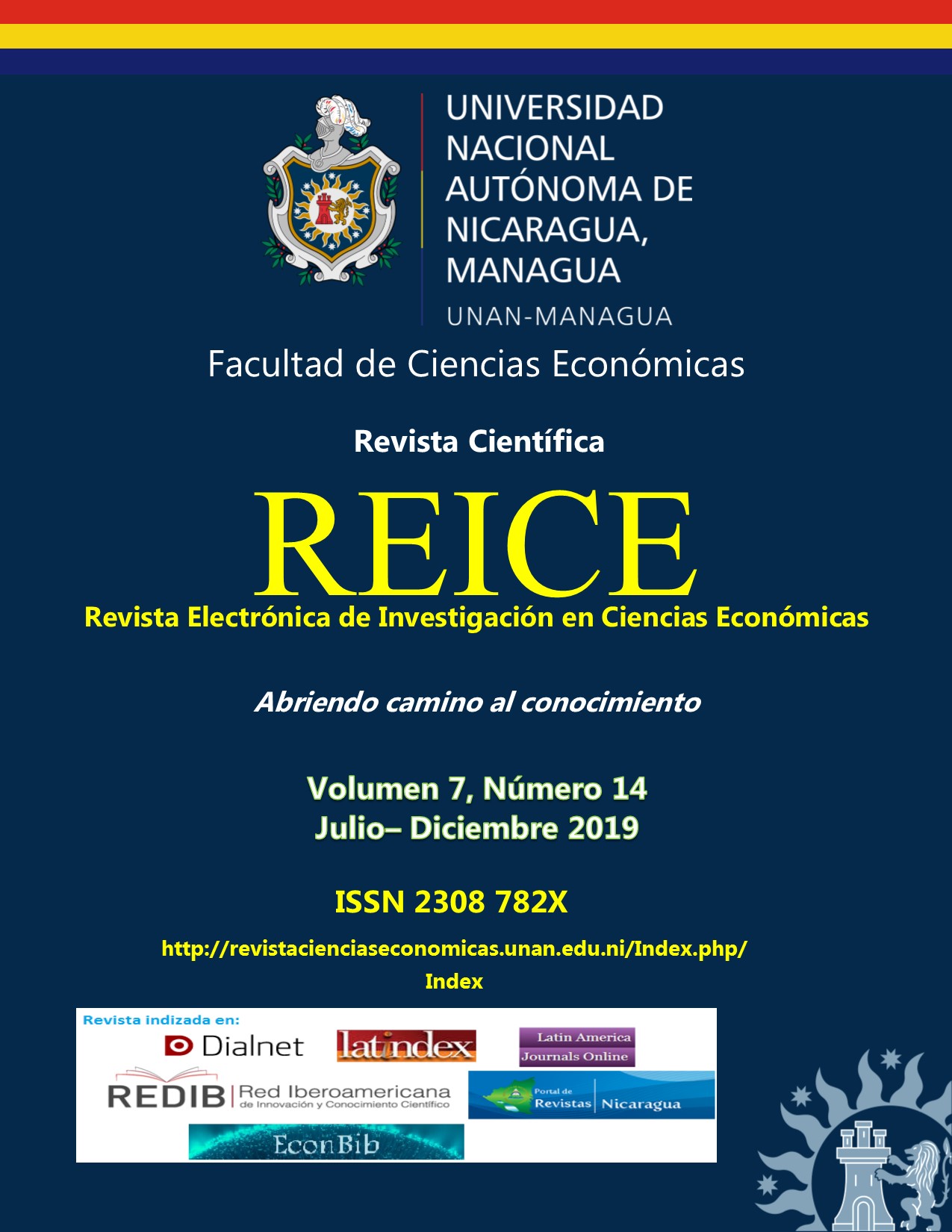Administrative control in eco-efficient management of water and energy: study an institution of higher education
DOI:
https://doi.org/10.5377/reice.v7i14.9373Keywords:
Eco-efficiency, water management, electricity, administrative control.Abstract
The objective of the research was to determine the relationship between administrative control and the eco-efficiency of water and electricity in the Faculty of Business Sciences of the National University of Education Enrique Guzmán y Valle, Peru in 2018. The methodology used was quantitative approach, non-experimental design, cross-sectional, descriptive and correlational. The sample was 274 people chosen at random from among teachers, administration staff and students. A structured questionnaire was applied for each study variable, with assessment scales to measure their relationships. The data were processed with the SPSS 24 program, which showed that the data did not have a normal distribution and were analyzed by Spearman's nonparametric R test. A very strong correlation between the study variables (r > 0.5) and the significant variables (Sig. < 0.05) was obtained. Likewise, a very strong and significant correlation was observed between the variables water eco-efficiency and electrical energy, which demonstrated co-linearity. It is recommended to promote activities in favor of the eco-efficiency of the use of water and electricity resources so that the community itself contributes to the adequate use of resources with the least environmental impact.
Downloads
1014
References
Alonso, M.A. (2013). Control: cuarta etapa del proceso administrativo. Guanajuato, México: Universidad Virtual del estado de Guanajuato.
Basuki, B. (2015). Eco-Efficiency and Sustainable Development as Efforts to Produce Environmentally Friendly Product: An Exploratory Case Study. Issues in Social and Environmental Accounting, 9(3), 199-218.
Bustamante, Y. (2011). Ecoeficiencia en la universidad hacia un desarrollo sostenible, Gestión en el Tercer Milenio. Revista de Investigación de la Facultad de Ciencias Administrativas UNMSM, 14(27), 47-53.
Cantú, P.C. (2015). Ecoeficiencia y Sostenibilidad. Ciencia UANL, 18(71), 34-38.
Chinchilla, A., Murrell-Blanco, M., Vetrani-Chavarría, K. & Bermúdez-Hidalgo, L. (2015). Propuesta para la gestión ecoeficiente de una planta de operaciones dedicada al manejo de residuos en el Instituto Costarricense de Electricidad. Revista de Ciencias Ambientales, 49(1), 55-71. doi: 10.15359/rca.49-1.4
Embid, A. & Martin, L. (2017). El Nexo entre el agua, la energía y la alimentación en América Latina y el Caribe. Planificación, marco normativo e identificación de interconexiones prioritarias. Santiago, Chile: CEPAL.
Hoffren, J. & Apajalahti, E. (2009). Emergent Eco-Efficiency Paradigm in Corporate Environment Management. Sustainable Development, 17, 233-243. doi: 10.1002/sd.387
Hopkins, W. (2014). A New View of Statistics. Recuperado de: https://complementarytraining.net/free-will-hopkins-a-new-view-of-statistics-pdf-printout/
Jara, E. (2009). El Control en el Proceso Administrativo. Recupera de: https://www.academia.edu/29995190/EL_CONTROL_EN_EL_PROCESO_ADMINISTRATIVO
Lloclla, H. & Arbulú, C.A. (2014). La educación en ecoeficiencia. UCV-HACER Revista de Investigación y Cultura, 3(1), 31-39.
López, E.C.I. (2013). Aplicación de las herramientas Web 2.0 en el manejo de la ecoeficiencia y su influencia en el desarrollo de actitudes ambientales en los alumnos del nivel primario de la Institución Educativa Privada María Bambina de la ciudad de Huánuco en el 2013 (Tesis de maestría). Lima, Perú: Universidad Nacional de Educación Enrique Guzmán y Valle.
Malandrino, O., Sica, D. & Supino, S. (2019). The Role of Public Administration in Sustainable Urban Development: Evidence from Italy. Smart Cities, 2, 82-95. doi: 10.3390/smartcities2010006
Mallar, M.A. (2010). La Gestión por Procesos: un enfoque de gestión eficiente. Revista Científica "Visión de Futuro", 13(1), 1-23.
Marume, S.B.M., Jubenkanda, R.R. & Namusi, C.W. (2016). Administrative Control and Evaluation. International Journal of Science and Research (IJSR), 5(1), 1074-1083.
MINAN. (2012) Guía de ecoeficiencia para oficinas del sector público. Lima, Perú: Ministerio del Ambiente.
MINAM. (2016). Informe: Instituciones Públicas Ecoeficientes. Lima, Perú: Ministerio del Ambiente.
Peña, H. (2018). Agua, producción de alimentos y energía. La experiencia del Nexo en Chile. Santiago, Chile: CEPAL.
Tuapanta, J.V., Duque, M.A. & Mena, A.P. (2017). Alfa de Cronbach para validar un Cuestionario de uso de TIC en Docentes Universitarios. Revista mktDescubre - ESPOCH FADE, 10, 37-48.
Downloads
Published
How to Cite
Issue
Section
License
Copyright (c) Revista Electronica de Investigacion en Ciencias Economicas
The rights to the articles published in REICE are from the journal, in order to be able to manage their best dissemination. However, since the purpose of the same is the dissemination of knowledge, this journal provides immediate free access to its content, under the principle that making research available to the public free of charge, which fosters a greater exchange of global knowledge.
The opinions expressed by the authors do not necessarily reflect the position of the publisher of the publication or of the UNAN-Managua. Its reproduction and distribution is authorized (in any type of support) provided that the following indications are fulfilled:
- The authorship of the work
- Indicate its origin (REICE magazine, volume, number and electronic address of the document)

